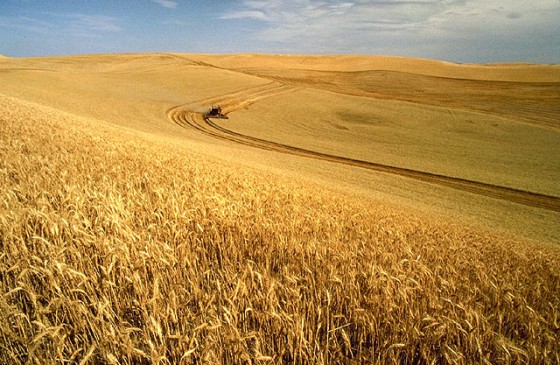On about one-third of the world's agricultural lands, farmers have maxed out the amount of rice, wheat and corn they can grow, according to a new study. The finding suggests a limit to the benefits of the so-called green revolution and portends hard work ahead to feed ever more, and more affluent, people.
A side effect of the plateauing — and in some instances, declining — crop yields is that more land will be required to meet food demand, as can be seen in the 8 percent expansion of agriculture area since 2002, much of it into rain forests, wetlands and grasslands, the study found.
"These are the last bastions of carbon rich, biodiverse areas," Kenneth Cassman, an agronomist at the University of Nebraska in Lincoln and a study co-author, told NBC News. "You have a large plume of greenhouse gases emitted every time you clear those kinds of lands for agriculture."
Assumptions challenged
The findings are published Tuesday in the journal Nature Communications. They "challenge the assumptions of compounding rates of crop yield increases," Deepak Ray, who studies global crop yield data at the University of Minnesota but was not involved in the new study, told NBC News via email.
Instead, the world's major cereal crops appear to hit a limit to how much grain they can yield, which is governed by factors such as sunlight, temperature and water availability in the regions where they grow, Cassman and his University of Nebraska colleagues Patricio Grassini and Kent Eskridge say in their paper.
In other words, agricultural techniques such as the use of synthetic fertilizers and pesticides, as well as crop varieties that are bred or genetically engineered specifically for high yield, help boost productivity — but they can do only so much. Yields eventually plateau.
Going forward, Cassman said, projections of future crop yields need to take this plateau into account. Such accounting, he added, makes the challenge of feeding the world "much larger than many previous studies have indicated."
Fill the gap
To feed the world and limit agricultural expansion, the study calls for intensive efforts to ramp up crop yields in regions of the world that are not yet maxed out, such as agricultural regions in Africa. The researchers say that means increasing access to fertilizers and high-yielding crop varieties, as well as building roads and other infrastructure to get the food to market.
"It is low-hanging fruit in the sense that yields are low and we have technology on the shelf that can help, but not unless we get the other enabling factors there to support it," Cassman said.
Closing this so-called yield gap in and of itself is insufficient to stop agricultural expansion, Cassman added, but it is a prerequisite.
"We know that unless you also have the proper land-tenure governance, [unless] you have laws that encourage conservation, you can still have expansion of agriculture just because it is profitable to do so for whatever reason," he noted.
John Roach is a contributing writer for NBC News. To learn more about him, visit his website.
